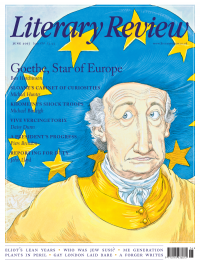John Lloyd
Despondent Correspondent
War and the Death of News: Reflections of a Grade B Reporter
By Martin Bell
Oneworld 295pp £18.99
A work whose title links war to the ‘death of news’ must prove a malign relationship between the two, and this one doesn’t. News isn’t dead; neither war nor Donald Trump has killed it. Martin Bell’s lament is the cry of someone whose view of the news media is bounded by the BBC, where he spent much of his life working. For him, the BBC’s great years, to which he was a major contributor, are gone: like many of his colleagues, he represents the organisation today as slow-witted, deeply conservative and uncaring, and run by opportunist idiots. This is probably evidence of love rather than hate – and so it should be, because the BBC served him as well as he served it.
Bell did National Service in the Suffolk Regiment, rising to the rank of acting sergeant, and served in Cyprus in the late 1950s, when the EOKA insurgency against British rule was at its height – ‘the best education that I ever had’. It taught him that respect for leadership is

Sign Up to our newsletter
Receive free articles, highlights from the archive, news, details of prizes, and much more.@Lit_Review
Follow Literary Review on Twitter
Twitter Feed
Under its longest-serving editor, Graydon Carter, Vanity Fair was that rare thing – a New York society magazine that published serious journalism.
@PeterPeteryork looks at what Carter got right.
Peter York - Deluxe Editions
Peter York: Deluxe Editions - When the Going Was Good: An Editor’s Adventures During the Last Golden Age of Magazines by Graydon Carter
literaryreview.co.uk
Henry James returned to America in 1904 with three objectives: to see his brother William, to deliver a series of lectures on Balzac, and to gather material for a pair of books about modern America.
Peter Rose follows James out west.
Peter Rose - The Restless Analyst
Peter Rose: The Restless Analyst - Henry James Comes Home: Rediscovering America in the Gilded Age by Peter Brooks...
literaryreview.co.uk
Vladimir Putin served his apprenticeship in the KGB toward the end of the Cold War, a period during which Western societies were infiltrated by so-called 'illegals'.
Piers Brendon examines how the culture of Soviet spycraft shaped his thinking.
Piers Brendon - Tinker, Tailor, Sleeper, Troll
Piers Brendon: Tinker, Tailor, Sleeper, Troll - The Illegals: Russia’s Most Audacious Spies and the Plot to Infiltrate the West by Shaun Walker
literaryreview.co.uk